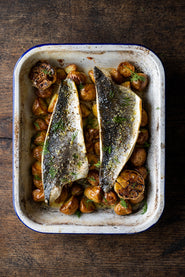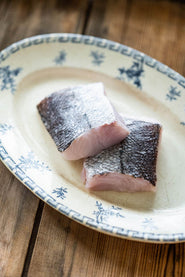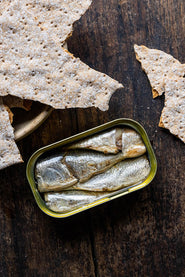A fish rich diet contributes to our wellbeing. It can be seen time and time again in cultures where large amounts of fish and seafood are consumed, populations record lower rates of cancer, heart disease and diabetes. It's not just the vast array of vitamins, minerals and omega 3s that fish have to offer, they also provide us with easily digestible, high quality protein - a vital ingredient in human health.

Oily fish are an incredible source of nutrition, while the term ‘superfood’ is so overused these days, there is something superior about fish and the ‘oily’ variety in particular. Consumed as part of a healthy diet, studies have clearly shown its power in lowering cholesterol, there is also growing evidence of the positive impact on our mental health, stemming from a healthy gut that is filled with a fish-rich diet.
Besides being uniquely nutritious, fish are also delicious. However, only one-third of UK consumers eat the public health recommended two portions of fish per week. With dietary considerations on the increase, it's time we 'get reel' about fish.

In the UK we buck the trend, in many countries around the world fish has traditionally been the primary protein, WWF estimates that approximately 3 billion people in the world rely on wild-caught and farmed seafood as a primary source of protein.
Globally fish and seafood are one of the largest traded food commodities in the world.
This dysfunctional, exploitative pressure of a global commodity has taken its toll on our natural resources. The United Nations Food and Agricultural Organization estimates that 85% of marine fish stocks are either fully exploited or overfished.
We scarcely understand the complex relationships between fish, the microorganisms that live in the sea and the natural environment of the seabed. Yet, by our hands, the marine environment is changing. Oceans have become filled with plastic, water temperatures are rising due to the climate crisis and seabeds are being destroyed by trawlers dragging heavy metal nets larger than football pitches - and often fuelled by slave labour.
In the past, our ability to influence that natural world was limited by our primitive tools and simplicity of catch methods. However, over the last 100 years, the advances made to commercial fishing have been staggering. Engines got faster, weather forecasting became more reliable and boats were able to travel further and deeper than ever before, dragging gear at depths unknown to our ancestors. The sheer volume of fish that could be caught with ease may have seemed like cause for celebration, but that’s the thing with nature, there is always a tipping point, or as sailors aptly describe it at sea ‘the point of no return’. Overfishing to near extinction is now so rife around the globe that species such as Atlantic Salmon, Blue Fin Tuna and Atlantic Halibut are in severe crisis, with many more species being pushed towards the threat of extinction.
Not all fishers practice this behaviour and it's exactly those people who love the sea and want to see their livelihood and their place of work protected, that we want to support.

It's not just reckless overfishing that is impacting fish stocks, there are vast amounts of waste bound around the industry like a messy, knotted fishing line. Many fisheries throughout the world throw away more fish than they actually keep, this is party due to fishing quotas which govern how much fish can be landed, instead of, crucially, how much fish can be caught. This system encourages the practice of ‘high grading’ which incites wasteful behaviour and means undersized fish have a reduced, and in many cases no value at all to fishermen.
It could be so easy to sit here and feel hopeless about the current situation and take a view that we must give up eating fish altogether, but there is hope on the horizon. Here’s the good news bit. There is so much that we can do to turn the tide on the globalised, dysfunctional fishing industry. On UK shores, we haven't passed the point of no return, there are still plenty of options for sustainable native fish and seafood that is worth celebrating.

It is now becoming easier for consumers to choose fish and seafood from well-managed stocks, caught by people who are custodians of our coastline.
On the front line of this movement is the MSC (Marine Stewardship Council) an international non-profit organisation on a mission to stop overfishing. For over 20 years, the MSC have been working with fisheries, seafood companies and scientists to help protect the oceans around us, and safeguard seafood supplies. The work they are doing is inspiring and this organisation is truly making a difference.
It's not just certification schemes that are making waves of positive change. WWF are actively engaging players from across the seafood value chain, from fisherman, farmers and processors to traders, retailers and restaurants they are helping the industry become part of the solution. Through this collaboration, WWF is driving impactful and sustained improvements in the health of the world’s oceans.

Locally, Cornwall Wildlife Trust has also stepped in to provide clear and accurate information to help consumers and businesses make environmentally informed decisions when purchasing Cornish seafood. In partnership with representatives from all sectors of Cornwall's fishing industry, they have established an Independent Advisory board that includes; Fishermen, Fishermen's representatives, fish sellers, restaurateurs, academics and Cornwall IFCA to spearhead an educational campaign and work directly with the fishing industry to inform, engage and encourage better fishing practices.
Unlike many of our European counterparts, the Cornish fishing industry is well managed and highly regulated. The fleet has reduced significantly in capacity over the last 20 years, and this combined with improved stock management at an international level has resulted in an industry that is more sustainable than ever before. The Cornwall Inshore Fisheries and Conservation Authority (CIFCA) proactively manages our inshore fisheries, and constantly carries out research to further the availability of knowledge.

Environmental legislation is also providing a high level of protection to our coastline. This includes protected areas such as the network of Special Areas of Conservation and Marine Conservation Zones (MCZs). These areas protect a range of nationally important, rare or threatened habitats and species. There are 91 MCZs in waters around England alone. In addition, fisheries legislation such as the ‘mackerel box’, the ‘hake recovery plan’, and the fishing industry-led seasonal ‘Trevose closure’, have contributed to the sustainable management of South West fisheries that have all shown a significant positive impact on the health of local fishing stocks. However, we would like to see Government do more to support our fishing community, by rewarding fishers for better practices, investing in furthering technological improvements for the industry and putting further protective and preventative measures in place.
While we have talked a lot about the challenges that face marine life, there is a vital component that we are yet to discuss, our fishing community.
Fishers have felt increasing pressure in recent years. The dysfunctional quota system has driven the industry towards practices that no good fisherman has felt comfortable with. The fishing community has been demanding to see change for years and with the carrot of Brexit and the idea of leaving EU red tape behind, dangled in front of them, after decades of battling over Brussels-set quotas, which allow European fleets to take a lion’s share of fish from waters around the UK, the idea of taking back control was irresistible, you can see why so many took the bait. They have since been vilified for an action, that came from a good place, a place of wanting to protect our coastline and wanting to improve an outdated system that was pillaging our seas.

So many of our fishing community have been displaced from their homes unable to make enough money to buy a house in their notoriously expensive sea-fronted towns and villages, making it more and more challenging for the industry to source skilled labour.
The work of a fisherman is incredibly tough, commercial fishing is certainly not a job for the faint-hearted. Crews are at the mercy of the weather, out at sea and miles from home. Fishing has been named as one of the most dangerous professions in the world. It’s no wonder so few young men and even fewer young women want to join this industry. When you look at the data, the British fishing community is made up of 97% men, with a mean average age of 51 and 95% are white. This startling lack of diversity and an ageing workforce does not bode well for the future - unless urgent help and support is put in place to buck this trend.

When our farm was founded over 30 years ago, the farming industry was not in too dissimilar a place, there was an ageing workforce carrying out farming methods that were destroying our soils, and increasingly livestock were being commoditised and traded, often skipping out the farmer almost completely in the value chain. Today, things are changing at lightning speed, with a growing awareness of how we want to see and value the food that is being produced, we and many others, have been able to disrupt the status quo, breathing life back into an industry on the verge of collapse. We have been able to make this change a reality for so many farmers, because you, our customers believed in us. We produced food you could trust and you valued and embraced it enabling our mission to grow and grow.
Change doesn’t have to come from the top, we as omnivores, have the power to make a positive difference with the choices we make about the food that’s on our plate.
We believe the same work can be done to support our amazing, hardworking British fishing community. We want to see families return to local harbours and go out fishing again utilising the decades of knowledge that exist around the ship's wheel. A fair price to be paid for their hard work - and a price that rewards and values good practices. We want to see technology used to improve knowledge of our waters and help us to fish better and kinder, to make fishing safer and more inclusive. Most of all we want to see healthy habitats that are thriving and can be enjoyed by future generations.
Together, with our friends Mitch Tonks and Rockfish, we are launching a range of seafood that honours this objective, landing the best fish from our coastline and delivering it directly to your home.







